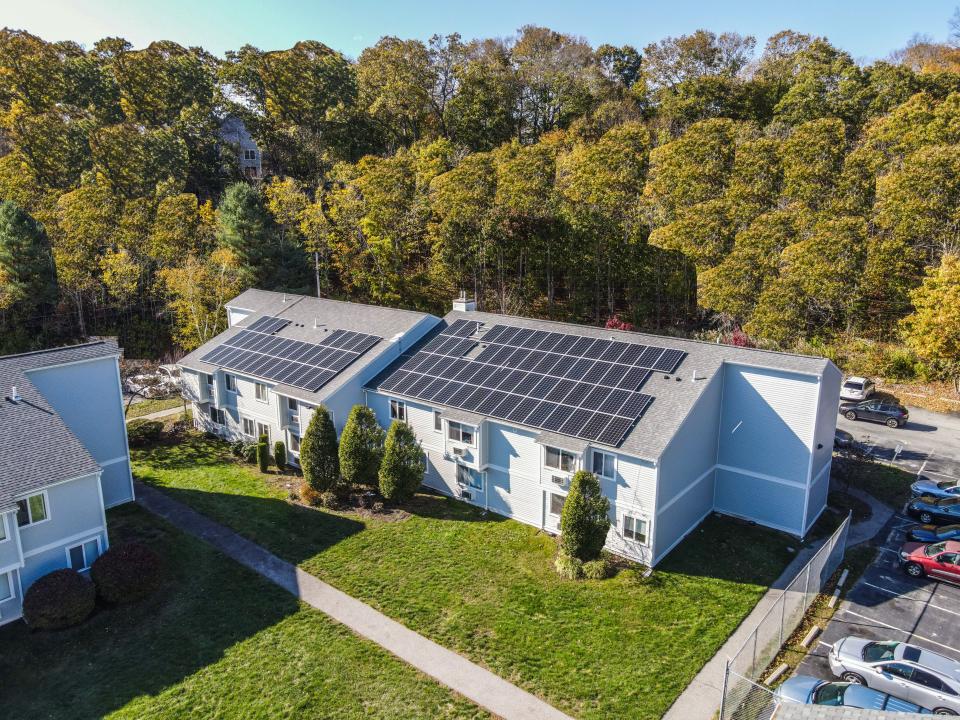This first-of-its-kind program will help lower income RIers go solar. Here's who qualifies.
PROVIDENCE – A new solar energy program being offered to low-income Rhode Islanders could save them hundreds of dollars a year, or more, on their electric bills.
The Affordable Solar Pathways Program, or ASAP, will use government funds to lower the costs qualifying households pay to lease rooftop solar panels, meaning they’ll see higher electric savings than in a typical solar leasing agreement.
Governor Dan McKee announced the start of the program Thursday, saying it aims to ensure that all Rhode Islanders, regardless of income, have access to new sources of clean energy as the state works towards the goals of the Act on Climate, the landmark law he signed three years ago that requires Rhode Island reach net-zero emissions by 2050.
“This is not only an issue that has to do with the Act on Climate, but this has to do with the economy of the state of Rhode Island,” McKee said at a news conference held at the Wanskuck branch of the Boys & Girls Clubs of Providence.

Who qualifies for the program?
While solar capacity continues to increase in Rhode Island, the costs of investing in rooftop panels, which can range upwards of $25,000 for a typical home, put solar out of reach for many homeowners.
Leasing panels is an alternative. A solar company installs and retains ownership of the panels, selling the power to the electric grid and charging a fixed monthly fee to the homeowner that is lower than their current electric bill.
PosiGen, the company partnering with the state on the new program, offers that typical arrangement to all homeowners in Rhode Island. But through ASAP, it’s sweetening the deal for households with an income less than or equal to 80% of the state median, and who are located in places defined as environmental justice areas where residents have disproportionately suffered the effects of pollution.
In Rhode Island, these areas include parts of Woonsocket, Central Falls, Pawtucket, Providence, Cranston, West Warwick, East Providence, Warren, Middletown and Newport.
As to the income guidelines, the ceiling for a single person is $34,039. For a family of four, it’s $65,460.
Households that qualify for ASAP will pay Posigen between $20 and $50 less per month for a solar lease, according to Kyle Wallace, vice president of public policy for the company. It could help translate to total annual savings on an electric bill of between $500 and $1,500, he said.
More: Smart electric meters are coming to Rhode Island. Here's why.
That’s comparable to what PosiGen saw in Connecticut, where it was the contractor for a low-income solar program a few years ago. The company combined energy efficiency upgrades with solar installations there and households saw net average savings on their electric bills of $700.
The company would do something similar in Rhode Island with efficiency work – such as improving insulation – to help families save money. Chief financial officer Ben Healey said PosiGen would only move forward with households if savings are projected.
“If we can save you money, you can go solar,” he said.
Believed to be first of its kind in the nation
The program is believed to be the first in the nation to use a new tax credit created by the federal Inflation Reduction Act in 2021. The credit, which PosiGen will be able to tap into, was specifically designed to expand renewable energy to lower income neighborhoods.
The federal incentive is being paired with $1 million from Rhode Island’s share of revenues from the Regional Greenhouse Gas Initiative, a cap-and-invest program that requires power plants to pay for carbon emissions.
More: Will Rhode Island meet its climate goals? Why the climate council says it's too early to tell.
The solar program is being administered by Rhode Island Commerce and the state Office of Energy Resources and developed with support from the nonprofit Clean Energy States Alliance.
It’s expected to fund up to 300 new solar installations. If it’s successful, it could be expanded in the future with more money, said Chris Kearns, interim commissioner of the energy office.
This article originally appeared on The Providence Journal: This program will help more Rhode Island families get home solar panels

